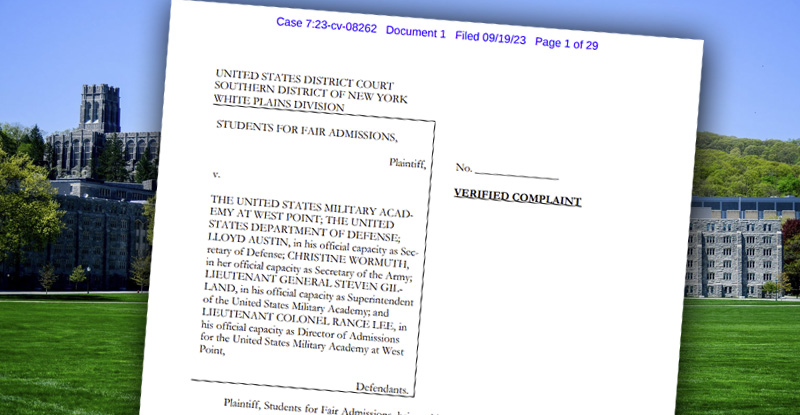The group that successfully challenged race-conscious collegiate student admissions policies at the U.S. Supreme Court sued the U.S. Military Academy at West Point on Tuesday, saying the Army school’s affirmative action practices unconstitutionally discriminate against white applicants.
The Virginia-based Students for Fair Admissions, founded by affirmative action opponent Edward Blum, seeks in the lawsuit to erase an exemption tucked inside the Supreme Court’s June ruling that allowed the prestigious U.S. military academies to continue using race as one of the factors weighed in student admissions. . . .
. . . . Blum’s group filed the lawsuit in federal court in White Plains, New York.
It accused West Point of violating the principle of equal protection enshrined in the U.S. Constitution’s Fifth Amendment and sought an order barring the academy from considering an applicant’s race during admissions.
It said that two of its members – white male high school students who were not identified – were ready and able to apply to West Point but that their race would prevent them “from competing for admission on an equal footing.”
The lawsuit said that West Point engaged in “racial balancing” when deciding who will be a future cadet and set benchmarks for the percentage of each class that should be filled by “African Americans,” “Hispanics,” and “Asians.”
Minorities made up 39% of the 1,255 cadets admitted into West Point for its 2027 class, according to its website.
Blum, who is white, said in a statement on Tuesday that “no level of deference justifies these polarizing and disliked racial classifications and preferences in admissions to West Point or any of our service academies.”
A West Point spokesperson had no immediate comment. . . . (read more on Reuters)
Complaint (PDF)
Students for Fair Admissions Files Lawsuit Challenging Racial and Ethnic Admissions Policies at West Point (Press Release, 19 SEP 23)
Today, Students for Fair Admissions filed a lawsuit challenging the use of race and ethnicity as admissions factors at the United States Military Academy (West Point).
SFFA alleges that West Point is violating the Fifth Amendment of the United States Constitution.
The Fifth Amendment contains an equal-protection principle that binds the entire federal government and is no less strict and demanding than the Equal Protection Clause that binds the States and all public entities.
SFFA petitioned the Court to enter judgment in its favor and to provide the following relief:
- A declaratory judgment that West Point’s use of race in admissions is unconstitutional under the Fifth Amendment.
- A preliminary injunction prohibiting West Point from considering or knowing an applicant’s race when making admissions decisions.
- A permanent injunction prohibiting West Point from considering an applicant’s race when making admissions decisions.
Edward Blum, president of SFFA, said,
“Over the years, courts have been mindful of the military’s unique role in our nation’s life and the distinctive considerations that come with it. However, no level of deference justifies these polarizing and disliked racial classifications and preferences in admissions to West Point or any of our service academies.”
Blum added,
“Because the U.S. Supreme Court’s recent opinion in the SFFA cases expressly forbids all institutions of higher education from using race in admissions decisions, it must follow that the U. S. military higher education institutions must end their race-based policies as well.”
Students for Fair Admissions
2200 Wilson Blvd. #102-13
Arlington, VA 22201
StudentsForFairAdmissions.org
edwardjayblum@gmail.com
703-505-1922
Contact:
Edward Blum
edwardjayblum@gmail.com
703-505-1922
1. The United States Military Academy, or West Point, is one of the crown jewels of the American military. It has trained the future leaders of the United States Army since 1802, producing some of our nation’s most revered generals.
2. West Point’s mission is “to educate, train, and inspire” future Army officers “for a career of professional excellence and service to the Nation as an officer in the United States Army.” The U.S. Military Academy at West Point, perma.cc/LM2A-BGH8.
3. For most of its history, West Point has evaluated cadets based on merit and achievement. For good reasons: America’s enemies do not fight differently based on the race of the commanding officer opposing them, soldiers must follow orders without regard to the skin color of those giving them, and battlefield realities apply equally to all soldiers regardless of race, ethnicity, or national origin. To that end, President Truman desegregated the military well before other institutions followed suit. See Executive Order 9981 (July 26, 1948) (“[T]here shall be equality of treatment and opportunity for all persons in the armed forces without regard to race, color, religion, or national origin.”).
4. Over the past few decades, however, West Point has strayed from that approach. Instead of admitting future cadets based on objective metrics and leadership potential, West Point focuses on race. In fact, it openly publishes its racial composition “goals,” and its director of admissions brags that race is wholly determinative for hundreds if not thousands of applicants.
5. West Point has no justification for using race-based admissions. Those admissions are unconstitutional for all other public institutions of higher education. Students for Fair Admissions, Inc. v. President & Fellows of Harvard Coll., 143 S. Ct. 2141 (2023) (“SFFA”). The Academy is not exempt from the Constitution. See, e.g., Crawford v. Cushman, 531 F.2d 1114, 1120 (2d Cir. 1976) (“A succession of cases in this circuit and others ha[s] reiterated the proposition that the military is subject to the Bill of Rights and its constitutional implications.”). And its calls for blind judicial deference to the military on questions of racial discrimination are “‘gravely wrong,’” both legally and historically. SFFA, 143 S. Ct. at 2162 n.3 (discussing the overruling of Korematsu v. United States, 323 U.S. 214 (1944)).
6. Because West Point discriminates on the basis of race, its admission policy should be declared unlawful and enjoined. . . . . . (read the full complaint)








Leave a Comment